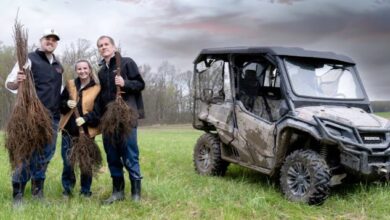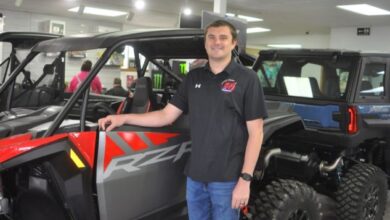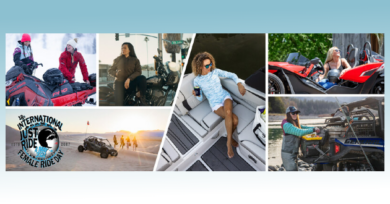Jan. 19, 2009 – Soaring to new heights
With record-breaking sales and a dealer network expected to exceed 100 this year, Eagle Rider has positioned itself as one of the premier powersports rental businesses in the industry.
Powersports Business had the opportunity to talk with Eagle Rider President Chris McIntyre about the company’s humble beginnings, and its rise in the powersports rental market.
Powersports Business: Can you explain a little bit about the history of Eagle Rider, and the growth it has experienced in the past decade?
McIntyre: The business opened in 1992, and it took us a year-and-a-half before we could even get insurance. We then opened in Los Angeles, then San Francisco in ’94 and Orlando in ’95. In 1996, we opened in Chicago, and at that point we realized it would take us forever to be in all the recreational locations we wanted to using that business model, because of cash flow limitations, etc., and that’s when we tested our first franchise outlet in Las Vegas, and it was a huge success, and we haven’t looked back since. We started with four people, and today at our corporate offices we employ more than 150.
PSB: What is the size of your current dealer network, and how many new dealers do you hope to add in 2009?
McIntyre: At the moment we have 74 outlets, and we’ll probably add another 25 this year. But our focus is not about getting big just to get big. We focus on making sure the timing is right for certain areas. Right now we’re keyed on developing certain parts of Florida, for example, like the Ft. Lauderdale area. We get a lot of requests from powersports enthusiasts across the world to have us open a franchise there, but we do the research first to ensure the market is there for this type of rentals. Vancouver, Canada, is one area where, believe it or not, the demand is through the roof. So areas like that, and Alaska are areas that we’ll look at closely and then try and find the right dealerships to partner with.
PSB: What are your most popular rentals, and where would you like to expand in terms of offerings?
McIntyre: We do more sport touring and cruiser, those are the most popular rentals by far. One area that there is quite a bit of demand is sport bikes, but the reason we encourage our dealers not to rent them is because the insurance risk is much higher. If you rent out 10 sport bikes, for example, odds are that two or three are going to be crashed. Out of 50,000 consumers who rented cruisers/touring bikes from us in 2008, total accidents probably were around 100. There’s a lot less risk with those bikes than what you might think because of the ages of renters riding cruisers, etc. It’s just not a wise business move renting sport bikes to 21- or 22-year-old kids. We do have programs with dealers that allow a demo program that involves sport bikes, but there is a lot to that and tighter restrictions, etc.
PSB: Which OEMs are you currently partnered with, and can you explain how your business relationship with them works? Is it similar to the rental car business?
McIntyre: We currently have arrangements with Harley-Davidson, Honda, BMW and Vespa. Our relationship with each of them is very different. It’s quite unlike the car rental business, where there is a set business model. Things are constantly changing in terms of partnerships depending upon the sales environment. When Harleys were being sold two years in advance, our partnership then was a lot different than it is now. In general our dealers out there all have million-dollar lines of credit with GE or American Honda for their floorplan to sell. For the first five years we worked really hard to put together finance packages for rolling inventory, because most of the finance companies wouldn’t fund that. So we created a subsidiary called Eagle Rider Finance, and it has a credit line of around $50 million where it provides a lease portfolio, so to speak. So if you’re a dealer and you want to rent 10 Gold Wings, five NightHawks and five Honda Metropolitan scooters, that fleet of 20 units, we automatically give them up to a $1 million credit line to buy the equipment from the manufacturer. Then we immediately offer a two-year lease to the dealer, and after they’re done with the lease term the dealer gets first right of refusal to buy the vehicles. And many will do that and then sell it as a late-model inventory. If they don’t want it, Eagle Rider will take it back and either redistribute to other franchises, or we’ll turn around and sell it. There are some manufacturers that require buybacks. Harley, for example, wants us to offer it first to the dealer that we bought it through, then we have to offer it back through the entire H-D dealer network, and finally we put it through National Powersports Auction, and finally it can be sold as used equipment.
PSB: Do you rent other powersports vehicles? What are your biggest challenges in renting ATVs, for example?
McIntyre: We do rent ATVs and side-by-sides, along with snowmobiles and PWC. We’ve been doing this for probably four years. It’s different because those items depreciate faster than motorcycles. There’s a huge market for ATVs, for example, in areas of the Midwest during hunting season. And that’s the beauty of our business. Not only do we bring consumers into a dealership that they most likely never would have gotten inside their doors if it wasn’t for the rental options. To be able to offer something to the hunting community is a big plus because it’s a much needed revenue stream to dealers during what is typically the slow season. The same goes for snowmobiles. It’s a huge boost for certain dealers. There’s a different type of training program at Eagle Rider University for franchises that are interested in offering powersports, mostly aimed at keeping those vehicles maintained, etc.
PSB: What’s been your biggest hurdle so far in establishing your brand name: Consumer recognition or industry recognition?
McIntyre: I would say consumers. Keep in mind, if you do $100 million in revenue, you hope to have $5 million set aside for marketing, and that’s really not much money in today’s market. We spend $30,000-$50,000 a month advertising on Google. It’s unbelievable how quickly you burn through marketing dollars. But our most important advertising source comes from customers and word of mouth, just letting people know that our services exist.
PSB: How did you fare sales-wise in 2008, and what are your expectations for this year?
McIntyre: This year has been our best year ever. Eagle Rider posted profits that were quadruple that of 2007, and the late-season months were very successful for us. In fact, September and October were the single biggest months in our history. Just because people aren’t buying powersports vehicles, it doesn’t mean that they don’t still want to escape on a bike and rent something to ride on for an afternoon or a long weekend. We expect our growth to continue this year as well, the potential for even bigger gains is certainly there.
PSB: Why is the rental market doing so well in comparison to many companies in the powersports industry?
McIntyre: First off we’re an emerging market, and the motorcycle/tourism/travel industry is really an untapped resource. There are a large number of people who might not want to buy, but it doesn’t mean they won’t spend $50 to rent a bike and escape for the day with their wife or friends. People still have the same passions, but instead of buying right now renting is the smarter option. Second, we cater more than half our business toward international customers. Fifty percent of our advertising revenue is spent advertising in Western Europe and parts of Asia, and as a result, we probably had 50-55 percent of our customer base coming from international locations to ride in America. So that factor helps us weather any conditions that would slow other companies that are dependent upon a strong U.S. economy.
PSB: Has your success spurred an increase in new competition?
McIntyre: Yes, we have seen an increase in competition, and I think that’s a good thing. However, the problem is that with the issue of the economy right now, there are a lot of mom-and-pop startups, and many aren’t carrying the proper rental insurance. That’s scary and it can really give this business a bad reputation if people wreck a vehicle and a company doesn’t have the proper insurance to cover any claims that might arise. Too many of these companies are looking to make a quick buck, and in the process skimp on some of the necessities like quality insurance. psb




